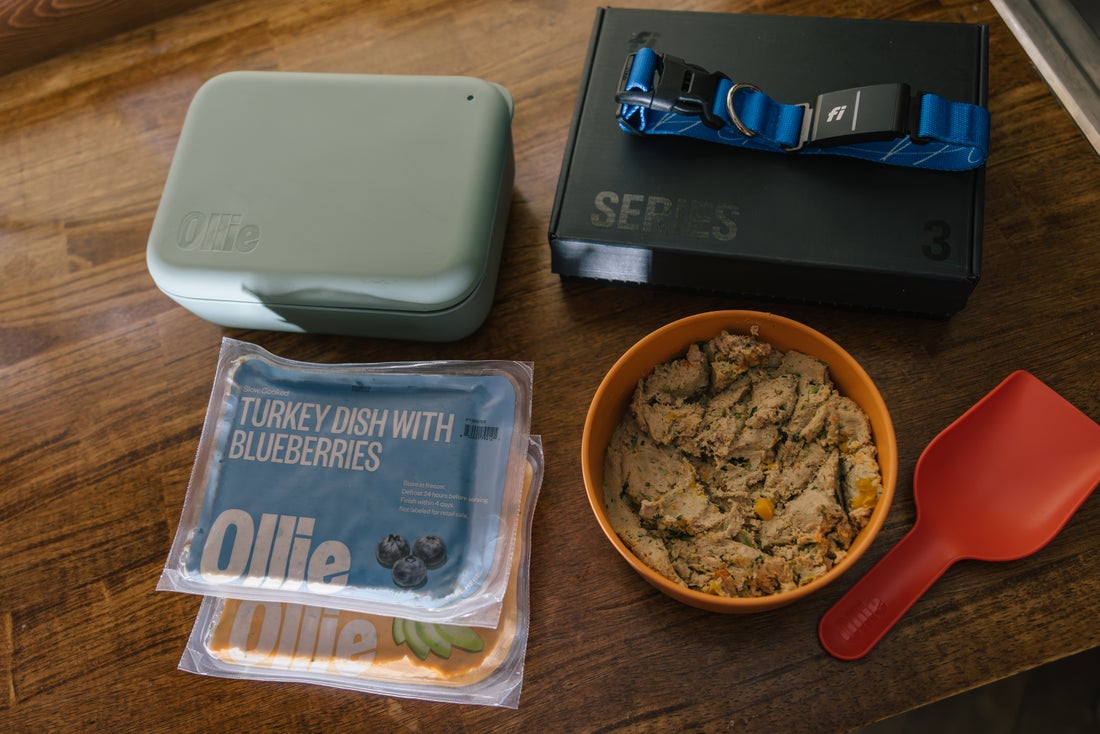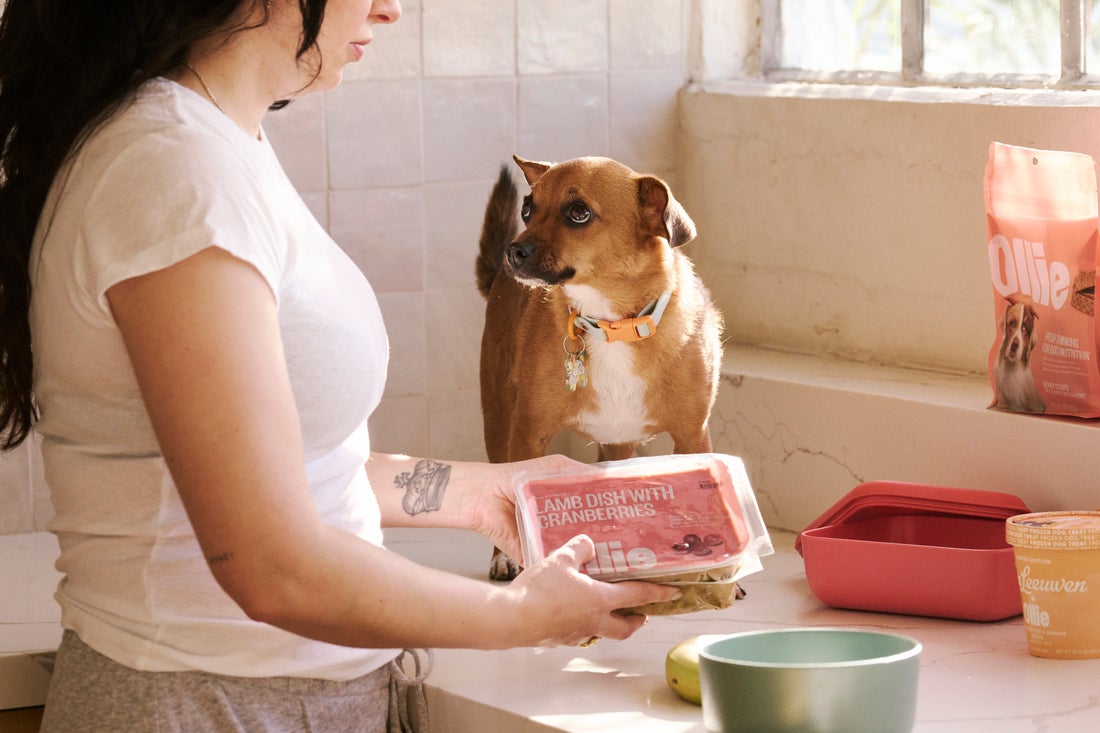Hey Ollie blog readers! We’re offering you an exclusive 60% OFF your starter box! Try now!
Digestive issues are common in dogs—from loose stools to gassiness, many pups experience some level of gut imbalance during their lives. One of the best ways to support digestive health is with probiotics—beneficial bacteria that help maintain a healthy gut microbiome.
While the word “bacteria” often sounds negative, not all bacteria are harmful. In fact, dogs need the right balance of good bacteria in their digestive system to properly absorb nutrients, support their immune system, and maintain regular, healthy digestion.
In this guide, we’ll explain what probiotics for dogs are, how they work, and the benefits they offer. We’ll also cover when your dog might need them and how to choose the right probiotic supplement. And because diet plays a major role in gut health, we’ll highlight how Ollie Fresh Dog Food and Probiotic Chews can work together to promote a happier, healthier digestive system.
What Are Probiotics for Dogs?
Probiotics are live microorganisms, primarily beneficial bacteria, that live in the digestive tract and help support a balanced, functional gut. These “good” bacteria aid in breaking down food, absorbing nutrients, and defending against harmful microbes that can disrupt the digestive system.
A dog’s gut contains trillions of bacteria, both helpful and potentially harmful. When this balance is disrupted—by stress, antibiotics, illness, or a poor diet—digestive issues often follow. Symptoms like diarrhea, constipation, gas, or inconsistent stool can all be signs of an imbalanced gut microbiome.
Probiotics help restore this balance by reintroducing helpful bacteria into the system. Specific strains, such as Lactobacillus acidophilus or Bifidobacterium animalis, have been shown to support digestive regularity, enhance immune function, and even improve the absorption of key nutrients.
How Ollie Helps:
Ollie Fresh Dog Food is made with gently cooked, whole ingredients that are easier to digest and promote gut balance naturally. For dogs who need added support—whether recovering from digestive issues or transitioning to a new food—Ollie Probiotic Chews provide a daily dose of science-backed strains to help maintain a healthy gut environment.
Benefits of Probiotics for Dogs
A healthy gut does more than just process food—it plays a central role in a dog’s overall wellness. Probiotics support this system by encouraging the growth of good bacteria, which in turn helps regulate digestion, strengthen immunity, and improve nutrient absorption.
One of the most well-known benefits of probiotics is better stool consistency. Dogs experiencing soft stools, diarrhea, or inconsistent bowel movements often benefit from a probiotic boost. Certain strains help restore microbial balance, especially after antibiotics, stress, or dietary changes.
Probiotics may also reduce gas and bloating, making digestion more comfortable. Some dogs experience fewer symptoms of food sensitivities or irregular digestion when their gut microbiome is balanced.
Beyond digestion, research shows that probiotics can play a role in supporting a strong immune response. Since much of the immune system is located in the gut, maintaining a healthy bacterial balance can help the body respond better to threats.
There’s also growing interest in the gut-brain connection. A stable digestive system has been linked to reduced anxiety and improved behavior in some dogs, though more research is ongoing in this area.
When Should You Give Your Dog Probiotics?
Probiotics can be used both for preventive care and for addressing specific digestive issues. Some dogs benefit from daily probiotics as part of their regular routine, while others only need them during periods of stress, illness, or change.
Here are common situations where probiotics can be especially helpful:
- After or during a course of antibiotics, which often wipe out both bad and good bacteria.
- During dietary transitions, like switching to a new food, which can temporarily upset digestion.
- In response to acute digestive issues, such as loose stool, diarrhea, or gas.
- During times of stress (travel, moving, boarding), when gut bacteria can become unbalanced.
- For dogs with sensitive stomachs or chronic gastrointestinal problems.
For dogs with ongoing issues, adding a probiotic supplement alongside a fresh, balanced diet may offer long-term benefits.
Types of Probiotics for Dogs
Not all probiotics are the same, and the form they come in can affect how well they work. The key is choosing a type that delivers live, effective strains of beneficial bacteria and is formulated specifically for dogs.
Food-based probiotics are found naturally in some fermented foods like yogurt or kefir, but these aren’t always ideal for dogs due to added sugars or lactose, which can cause digestive upset. While a lick of plain yogurt might not hurt, it typically doesn’t offer the concentrated strains needed for therapeutic results.
Probiotic supplements are the most reliable option. These are available in powders, capsules, or chewable formats. The best supplements contain well-studied strains like Lactobacillus acidophilus, Bifidobacterium animalis, or Enterococcus faecium, along with a guaranteed live colony count (CFUs).
Veterinary-prescribed probiotic powders may be recommended in more severe cases or during recovery from illness or antibiotic use.
Why Ollie Probiotic Chews Stand Out:
Ollie Probiotic Chews are designed specifically for dogs and contain proven strains that support gut health, immune balance, and digestion. They’re easy to give, tasty for dogs, and formulated to pair perfectly with Ollie Fresh Dog Food, creating a daily routine that helps your dog feel their best from the inside out.
How to Choose the Best Probiotics for Dogs
Choosing the right probiotic means looking beyond the label. Not all supplements deliver meaningful results, so it’s important to focus on quality, safety, and the right bacterial strains.
Here’s what to look for:
- Strain specificity: Look for products that list the exact strains used (e.g., Lactobacillus acidophilus), not just “probiotics.” Different strains support different functions.
- Live culture guarantee: A probiotic should guarantee the number of live cultures (CFUs) through the product’s expiration—not just at the time of manufacture.
- Formulated for dogs: Human probiotics aren’t always appropriate for dogs. Choose a supplement specifically designed for canine gut health.
- No unnecessary additives: Avoid products with artificial flavors, preservatives, or fillers that may cause irritation or disrupt digestion.
Probiotics vs. Prebiotics: What’s the Difference?
While the terms sound similar, probiotics and prebiotics serve different but complementary roles in your dog’s digestive health.
Probiotics are the live, beneficial bacteria that help support a balanced gut. They work to improve digestion, boost immune response, and restore healthy flora when things get out of balance.
Prebiotics, on the other hand, are non-digestible fibers that feed the good bacteria already living in your dog’s gut. Think of them as fertilizer for probiotics—without prebiotics, beneficial bacteria may not thrive or multiply as effectively.
Dogs benefit most when they receive both probiotics and prebiotics, either from their diet or as part of a supplement. This combination helps maintain a more stable and diverse gut environment, which is key to good digestion, nutrient absorption, and immune function.
How Ollie Helps:
Ollie Fresh Dog Food includes naturally occurring prebiotic fibers from ingredients like sweet potatoes, pumpkin, and oats, which help nourish good gut bacteria. When paired with Ollie Probiotic Chews, which provide targeted live cultures, your dog gets a full spectrum of digestive support—from fuel to flora.
Frequently Asked Questions About Dog Probiotics
What are the best probiotics for dogs?
The best probiotics for dogs include strains like Lactobacillus acidophilus, Bifidobacterium animalis, and Enterococcus faecium. Look for products specifically formulated for dogs with guaranteed live cultures and no artificial additives.
Can I give my dog human probiotics?
It’s not recommended. Human probiotics may not survive in a dog’s digestive system or may not include the right strains for canine health. Always choose probiotics made for dogs.
Do probiotics help dogs with diarrhea?
Yes. Probiotics can help restore balance to the gut during or after episodes of diarrhea—especially if caused by antibiotics, stress, or dietary changes.
Should I give my dog probiotics every day?
Daily use is safe and often beneficial, especially for dogs with sensitive stomachs, chronic digestive issues, or those on a fresh diet that supports gut health.
What foods are natural probiotics for dogs?
Fermented foods like plain yogurt or kefir contain probiotics, but they may not provide enough live cultures—or may contain ingredients that upset your dog’s stomach. Supplementing with a probiotic chew is more reliable.
Are probiotics safe for puppies?
Yes, many probiotics are safe for puppies, especially during diet transitions or after antibiotics—but always check with your vet first.
Can probiotics help with skin allergies or itching?
In some cases, yes. A balanced gut may support a healthier immune system, which can reduce skin inflammation and allergic responses over time.
How long do probiotics take to work in dogs?
Some dogs show improvement in stool consistency or digestion within a few days, while others may take a couple of weeks to see full benefits.
Tagged As:

The nutrition your dog needs,
the food they want.

Enjoying our articles? Subscribe our Newsletters and get new articles directly to your inbox
You might also like
18 September 2025
4 MINS READ
Is Fresh Dog Food Easier to Digest?
Yes, fresh dog food is generally easier for dogs to digest than highly processed kibble. Because it’s made with whole ingredients, gently cooked, and free from unnecessary fillers, fresh food supp…
by Ollie Pets
18 September 2025
5 MINS READ
Can I Rotate Fresh Dog Food Flavors?
Yes, it’s safe to rotate fresh dog food flavors, and many dogs actually benefit from the variety. At Ollie, we offer multiple fresh recipes, like Beef, Chicken, Turkey, Lamb, and Pork so you can…
by Ollie Pets
18 September 2025
5 MINS READ
Is Fresh Dog Food Safe During Power Outages?
Fresh dog food is only safe during a power outage if it has stayed cold, specifically, below 40°F. Once the temperature rises above that point, bacteria can start to grow, and the food may no lon…
by Ollie Pets







